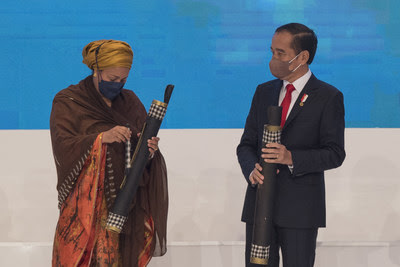BADUNG, Indonésie, 28 mai 2022 /PRNewswire/ — L’Indonésie et le Bureau des Nations Unies pour la réduction des risques de catastrophes (UNDRR) accueillent la septième session de la Plate-forme mondiale pour la réduction des risques de catastrophes (PM2022) à Bali, en Indonésie, du 23 au 28 mai 2022, comme l’a indiqué le ministère des Communications et de l’Informatique de la République d’Indonésie.

Il s’agit de la première plateforme mondiale depuis le début de la pandémie de COVID-19. C’est également la première fois qu’elle se tient dans la région asiatique.
La Plateforme mondiale est le principal forum mondial multipartite qui évalue et examine les progrès réalisés dans la mise en œuvre du Cadre de Sendai pour la réduction des risques de catastrophe (2015-2030).
L’événement de cette année est un forum important car il donne l’occasion à tous les pays de faire le point sur les progrès accomplis et d’accélérer la mise en œuvre du cadre de Sendai dans le contexte de la pandémie de COVID-19.
Dans son discours d’ouverture, S.E. le président indonésien Joko Widodo a rappelé la nécessité pour toutes les nations de faire face aux risques de catastrophe sans négliger le développement durable. « Aujourd’hui, à la Plateforme mondiale pour la réduction des risques de catastrophe, l’Indonésie propose au monde un concept de résilience durable comme solution pour atténuer toutes les formes de catastrophes, y compris les pandémies », a déclaré le président Widodo.
La vice-secrétaire générale des Nations unies, S.E. Amina J. Mohammed, a souligné l’urgence d’agir rapidement pour renforcer la résilience mondiale aux catastrophes. Le rapport phare de l’ONU sur l’évaluation mondiale, qui a été publié le mois dernier, a tiré la sonnette d’alarme sur le fait que l’humanité était dans une « spirale d’autodestruction », avec le potentiel d’atteindre 560, ou une moyenne de 1,5 catastrophe de moyenne ou grande échelle par jour, d’ici 2030 sans une révision radicale de la façon dont le risque est géré et financé. Ce constat est particulièrement pertinent pour la région Asie-Pacifique, où les catastrophes coûtent en moyenne 1,6 % du PIB par an, soit plus que dans toute autre partie du monde.
« Au cours des trois prochains jours, nous aurons une occasion unique d’examiner les meilleures options politiques pour passer du risque à la résilience et de prendre des mesures importantes pour que la reprise après le COVID-19 nous remette sur la voie d’un avenir sûr et durable », a déclaré Amina Mohammed.
Deux dialogues de haut niveau sur l’accélération de la mise en œuvre mondiale du cadre de Sendai et des objectifs de développement durable ainsi qu’une table ronde ministérielle sur le défi posé par l’urgence climatique figure parmi les principaux points à l’ordre du jour de la première journée de la plate-forme mondiale.
Environ 7 000 délégués représentant des organisations gouvernementales et non gouvernementales de plus de 185 pays membres et observateurs participent à cette conférence.
Photo – https://mma.prnewswire.com/
